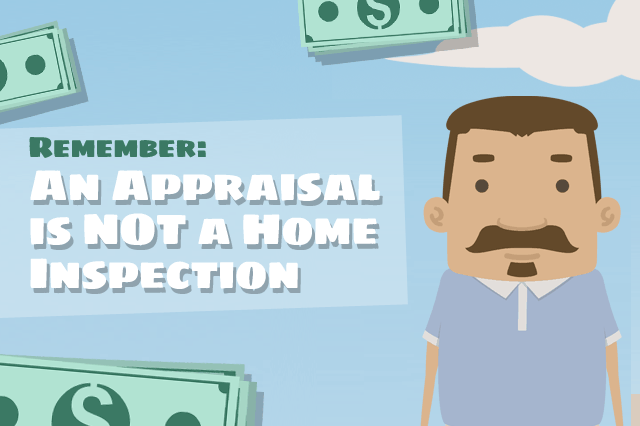How Is an FHA Appraisal Different From an FHA Inspection?

Do you know what the FHA appraisal is designed to do? Some people mistake the appraisal for a home inspection, which is definitely not a good thing to do when you’re trying to buy the right home for your needs. As we’ll discuss, the appraisal--a mandatory part of the loan process--is not intended to be a top-to-bottom review of all features of the home.
The FHA appraisal process does two important things. The first is to establish the fair market value of the home. This is where an FHA appraiser–who is not a home INSPECTOR–reviews the home, walking through the property to determine whether it meets minimum standards for safety and habitability.
The appraiser will also compare the property to others like it on the market--”comparables”, which are, as the name implies, used to review the condition and quality of the property against others like it.
After the walk-through, the appraiser will generate an appraisal report, which is delivered to the lender. Please note that it is not the FHA appraiser’s job to “approve” the home with an FHA seal of approval. Just because the home passes the appraisal process does not mean it is defect-free.
The appraiser simply verifies that yes, the home meets FHA minimum requirements and state/local building code insofar as the appraiser can tell. Where appropriate the appraiser will note defects, problems, or hazards on the report as detected during the appraisal process.
The appraisal report will note corrections, where appropriate. A roof, for example, can be repaired, a source of excessive moisture might only require a certain repair or correction. In these cases, such corrections would be required as a condition of loan approval.
If such repairs are needed, the borrower should expect a compliance inspection to insure those repairs, corrections, and fixes are properly executed. Budgeting for a compliance inspection is very important--your appraisal plus any required compliance inspections are the borrower’s responsibility when it comes to paying for these services rendered--payment is definitely required no matter what the outcome of each visit might be.
For some properties, problems or conditions cannot be repaired and the home is declared unsuitable for an FHA loan. A home situated in certain high pressure gas pipeline easements, special flood zones, high noise areas, etc. may be rejected for an FHA mortgage loan due to those conditions.
It is crucial for the borrower to remember that regardless of the results of this appraisal process, the appraisal itself is definitely not a guarantee that the home is free from defects. All home buyers should pay for an optional (but critically important) home inspection for a more in-depth review of the home. A home inspection is your chance to become a truly informed buyer thanks to the work the inspector does for you.

Do you know what's on your credit report?
Learn what your score means.






